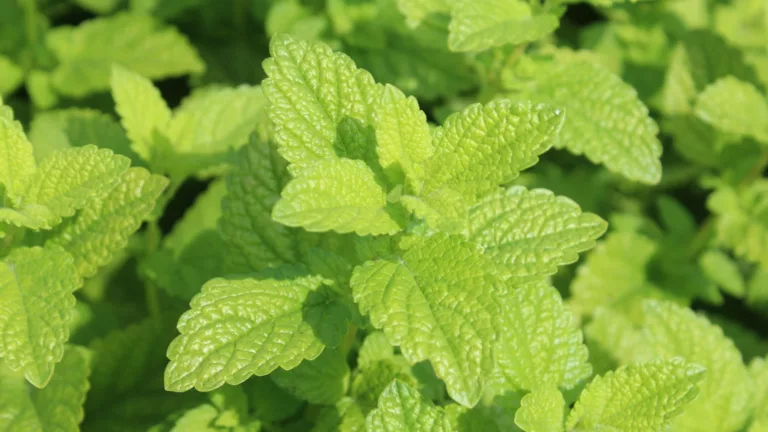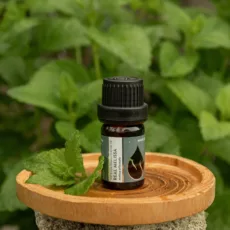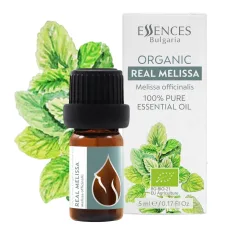Lemon Balm Oil – Unique and Priceless

Lemon Balm Essential Oil Has Many Beneficial Effects on Body and Mind. Here Are 10 Health Benefits We’d Like to Share
Pure lemon balm essential oil is one of the most expensive and valued essential oils in the world. It was used in deep antiquity by Egyptian and biblical kings and queens for their health. Records of lemon balm essential oil have been found in Mesopotamia and Ancient Egypt. Over the past few decades, the pharmaceutical industry has shown growing interest in researching the oil’s various constituents.
Lemon balm essential oil contains citral (40–70%, a mixture of the isomers geranial and neral), citronellal (1–20%), β-caryophyllene (5–15%), and germacrene D (about 5%). Other characteristic components include linalool, geraniol, caryophyllene oxide, methyl citronellate, 6-methyl-5-hepten-2-one, geranyl acetate, α-copaene, and nerol. The oil ranges from pale yellow to yellow-brown. It is obtained by steam distillation of fresh leaves, sometimes of the entire fresh herb shortly before full bloom, because the essential-oil content is then highest and the aroma strongest.
Today, lemon balm essential oil is used mainly in pharmacy, aromatherapy, and medicine. It is known for anticancer, antibacterial, antimicrobial, antihistamine, antispasmodic, and antioxidant properties. It also has a pronounced antiviral effect against herpes. Other noted properties include anti-ulcer, stimulating, calming to the nervous system, sleep-promoting, immunomodulatory (against HIV-1), cardiotonic, relaxing, anticonvulsant, and relief of menstrual pain and cramps. It also acts as a natural calming agent and a natural antidepressant.
1) Treats herpes and other viruses
One of the best-known benefits of pure lemon balm essential oil is its natural ability to treat the most common herpes infections: herpes simplex type 1 and type 2. The first causes itchy blisters around the mouth; the second affects the urogenital system and is sexually transmitted. Scientists have found that higher concentrations of the essential oil can kill nearly all herpes viruses. The effect likely comes from tannins binding to viral proteins and the cell membrane, preventing the viruses from adsorbing to the cell. Treatment should therefore be timely—before the viruses penetrate the cell membrane. For this reason, lemon balm oil is considered one of the most potent antiviral agents in aromatherapy.
2) Calms the nervous system
This prized oil has an overall beneficial effect on the nervous system. In herbal practice it is used to reduce heightened nervous excitability, restlessness, anxiety, stress, and insomnia. Even its gentle, fresh citrus scent has helpful psychological effects, soothing and increasing the brain’s production of serotonin—the neurotransmitter that helps us feel happy, confident, and content for longer, bringing a zest for life.
3) Reduces symptoms of Alzheimer’s disease
Lemon balm is perhaps the best-studied essential oil for the natural therapy potential in Alzheimer’s disease. Iranian physicians report that the calming effect of Melissa officinalis benefits agitation and increased motor activity in Alzheimer’s patients.
In a placebo-controlled clinical trial in Tehran, doctors studied Melissa officinalis in patients with mild to moderate Alzheimer’s over four months (18 men and 24 women, ages 65–80). Disease stage and dementia severity were assessed with specific scales. After four months, patients treated with lemon balm performed significantly better on cognitive tests than those on placebo.
Ballard et al. (2002) conducted the first double-blind, placebo-controlled study of aromatherapy for BPSD (behavioral and psychological symptoms of dementia) in Alzheimer’s. According to the authors, aromatherapy with lemon balm essential oil was well tolerated and showed significant improvement in the intervention group—reducing anxiety, improving behavioral and psychiatric symptoms, and enhancing overall well-being. The study recommends adding essential oils to a cotton pad or diffuser placed near the bed or in the living area to help control agitation.
4) May protect against cancer
De Sousa et al. (2004) found that lemon balm essential oil has both antioxidant and antitumor actions, showing notable efficacy against several human cancer cell lines (A549, MCF-7, Caco-2, HL-60, K562).
5) Lowers cholesterol levels
A clinical study by S. Bolkent et al. (2005) indicates that lemon balm essential oil reduces total cholesterol, total lipids, ALT, AST, and ALP in serum, lowers LPO levels in liver tissue, and raises tissue glutathione. The authors concluded the oil has pronounced hypolipidemic properties and a protective effect on the liver.
6) Powerful antimicrobial potential
Using GC-MS, Araujo et al. (2003) confirmed antimicrobial efficacy of lemon balm oil against five yeasts involved in food spoilage (Torulaspora delbrueckii, Zygosaccharomyces bailii, Pichia membranifaciens, Dekkera anomala, and Yarrowia lipolytica). At 500 µg/mL the oil completely inhibited molds and all tested yeasts. The key component behind this strong fungicidal and antiviral effect was citral (58.3%).
7) Suppresses inflammation
Lemon balm essential oil contains active constituents with potent antioxidant and anti-inflammatory effects. In a clinical study, Mimica et al. (2003) described its antimicrobial activity and DPPH radical-scavenging capacity. Robust antimicrobial effects were confirmed against various pathogens—six fungi and thirteen bacterial strains—with very strong antioxidant capacity. Identified contributors included monoterpene aldehydes and ketones (neral/geranial, citronellal, isomenthone, menthone) and mono- and sesquiterpene hydrocarbons (E-caryophyllene). The strongest antibacterial effect was against multi-resistant Shigella sonnei.
8) Natural calming effect
Multiple clinical studies show lemon balm alleviates anxiety, insomnia, and restlessness. Enhancing activity of GABA (gamma-aminobutyric acid) plays a key role. A 2017 Phytotherapy Research study examined lemon balm’s effects on GABA over-stimulation and found it effectively increased GABA activity in the brain, similar to how some drugs act on GABA receptors. A 2016 paper analyzing lemon balm’s chemistry concluded it contains compounds that stimulate GABA receptors and improve GABA binding. Another study notes that rosmarinic acid inhibits an enzyme that removes GABA, thereby increasing GABA levels and calming the mind. Rosmarinic acid is one of lemon balm’s key actives responsible for easing stress and anxious thoughts.
9) Lowers high blood pressure
Lemon balm essential oil has antihypertensive properties that help reduce elevated blood pressure—a confirmed risk factor for coronary artery disease, one of the leading causes of death in developed and developing countries.
10) Protects the skin
The Journal of Dermatological Science reports that lemon balm oil helps protect the skin from UV damage—a leading cause of skin aging and skin diseases, including skin cancer. The same study found the oil has melanogenic properties that help reduce unwanted sunspots (also known as age spots). In sum, its strong antioxidant properties help protect the skin.
Pleasant, versatile ways to use it
Aromatherapy (inhalation of essential-oil vapors) is ideal for relaxation, for easing dementia and Alzheimer’s symptoms, and for reducing anxiety. This can be done daily. For topical use, dilute essential oil in carrier oils before applying to the skin. Oral use should be approached with caution and only after a tolerance test.
True, pure lemon balm oil (Melissa officinalis) is exceptionally valuable. Essences Bulgaria offers only highly effective essential oil with top purity and excellent quality—at an unbeatable price!




